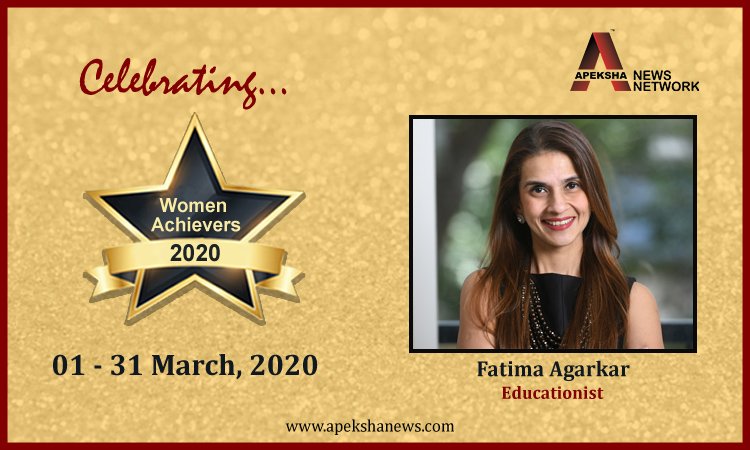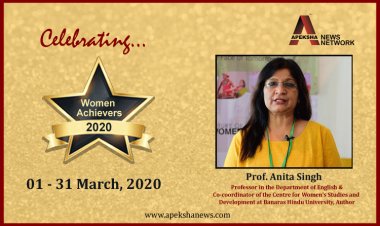“The presence of AI and technology to aid the teaching-learning process has been path-breaking," says Educationist Fatima Agarkar

The teaching landscape will transform if teachers and educators can reimagine their role from ‘teaching’ to ‘reaching’ them, this belief appropriately sums up Fatima Agarkar’s incessant journey in the ever-evolving field of education.
Having kick-started her career in the corporate world, she always had an inner urge to bring about an enhancement in the sphere of education which drew her towards embracing the precinct. Having gathered tremendous experience in the edification zone, she has been creating more opportunities for stakeholders with an undying passion for teacher training, refining children with special needs and emphasizing on the significance of sports. Utilizing the inventive teaching models, refining erudition outcomes and retaining them, her exertions and spectacular works have proven to be a real opportunity to alter the lives of children.
She was adjudged as Education World’s top 50 young educators in the year 2014. Adding more feathers to her hat, she has also been the recipient of several prestigious awards for her outstanding contribution to the field of education in the years 2013 and 2015. Fatima has been awarded by Giants Group for her outstanding contribution to the field of education, the Young Achiever’s Award in the year 2017, Singapore based, Best of Asia’s, ‘Enterprising Educator in the year 2018 and as an entrepreneur ‘Best Edupreneur 2019 and Best Leadership’ by Progressive Academic Excellence India (Maharashtra 2019) and one of the 10th finest inspirational educators in 2019 by TKR, India . Donning all the skills of an adroit speaker, addressals by her during conferences and summit are not just informative and concrete, but also eye-opening.
Apeksha news Network had a chance to interact with the social entrepreneur and educationist, Fatima Agarkar who believes that in order to become a creative educator one needs to be an innovator first. Check out the excerpts!
How has been the journey so far for you as an Educationist? Tell us about the changes that you have witnessed in the field.
The journey so far is fulfilling and my profession keeps me on my toes. Never a day without challenges to be dealt with, and yet each day makes you more complete enabling you to strive to become better for the sake of the children we nurture.
Changes over the years? The presence of more corporates entering the field of education and bringing in professionalism; progressive strategies being implemented that helps the industry to evolve. Also, the presence of AI and technology to aid the teaching-learning process has been path-breaking. Most important more transparency in the system and questioning traditional practices so that we make these kids more adaptable and make learning more relevant. A focus on sports, creative arts, performing arts within the mainstay curriculum as a matter of importance including life skill development are some of the other significant features.
Education, today, is considered as a business. What your opinion on same?
Private players entering the industry will have to factor in a ‘business opportunity’ and like our counterparts in the western world, private non funded schools can provide quality systems and processes, have more accountability for their team members and generally deliver like a ‘corporate’ which also means there is a capitalization of a ‘business opportunity’. This industry is like healthcare for example hospitals. There is a business angle to it but one is assured of quality, professionalism, best practices which makes it simply a better product. I think private sector presence with a profit motive is not an ‘evil’ with the right governance and we need to admit that education does not always have to be about charity. There can still be a way of ensuring that for a country as vast as ours and unequal distribution of resources etc, we need a strong public-private relationship, and this may be the winning formula that we have as a nation.
Many cases have been witnessed wherein children take adverse steps like suicide as they are not able to meet expectations of their family/parents in terms of education. What is your opinion on same?
Sad and disturbing reality of this era! Despite all the progress we speak of, not being able to help children cope is one of the biggest ‘failures’. As adults, we need to take stock of our own aspirations and what we are communicating with our children to make them so emotionally unstable that they can take their own lives!
We cannot be losing lives... we need to be in a position to save them. So, in my opinion, we need to ideate more and ensure that we are alert and ready to reach out and orient these children but first reflecting on our own actions.
How this issue can be eradicated, or such things can be prevented? How can government help in this, any suggestions to the government?
Counseling in school, being more observant and intervening at home real-time when we identify the problem. Emotionally secure children can ‘cope’ and it will be our responsibility to create such environments for them at home and in school. Communication remains the key and being vigilant to the changing signs.
With the world evolving and changing so rapidly, we will also need to recognize that children need to ‘adapt’ and we remain the adults who will have to ‘steer’ them to remain on track and impaneling experts from time to time will also be a key differentiator for what works and does not work.
The government can recognize that this emotional security remains a priority for educators and focus on skill development as a learning journey rather than the mark crazy obsession that usually drives children to make rash decisions. More awareness, acceptance and making it an important aspect of the education policy will have the ones implementing the programs in schools take notice of this creeping menace with the view to ‘correct’ it.
What are some overlooked issues of the overall education system in India on which you wish to focus and work?
National academic boards need to rethink the assessment patterns - the kind of questions and expectations as some of the syllabus content is dated and not relevant to the era the children are growing up with.
The divide between public and private education widens each year, and it is about time, lawmakers recognize that Public-Private partnerships are impactful and this needs to be one of the most sought-after decisions.
Laws need to be more streamlined for management in the education space and those with a clear vision and a desire to improve systems, setting up their institutions should have more support from local and national bodies.
Most importantly, the content that is being taught as part of the national board needs to be more futurist and forward-looking, and teachers need more skilling as they deliver this content.
You have been part of the education system for a long considerate time. Education plays a huge role towards the growth of the country, considering culture, youth, etc. What do you feel that what kind of education system does India needs currently?
Skill-based, relevant, futuristic, inclusive of life skills, and more holistic in nature. We need to create future-ready life citizens, not class ready puppets.
What barriers have you faced, as a woman, in becoming successful in your field? How did you overcome them?
For me, barriers or challenges are those faced by any individual who is part of the corporate world or start-ups. Time management, funding, laws, etc are common challenges and for me, this has never been an issue related to gender. Fortunately, as I grew up, my parents have been very supportive of me and brother. Also, the conversations at home were always about being responsible, honing passion, equality and discipline.
With regards to overcoming challenges like they are meant to be - identify the problem, analyze its root cause, consult people, create alternative strategies and execute quickly defining what works and what does not.
What is the biggest struggle of a woman entrepreneur today in India?
Expectations of society for a woman to do it all - personal and professional without any exception. In the same vein, men can focus more on their profession but women are expected to ‘balance’ both out. This might be more true for India as it remains a culturally sensitive and traditional society with age-old expectations. The landscape is changing, but not as rapidly as one would expect.
A female entrepreneur or young woman who wants to be an entrepreneur does not always start off from a level playing field compared to a young man from the same community. She may not have access to the start-up capital (land, house, money) she needs to start her business and she may also have other time commitments like childcare. Do you think the existing programs introduced by the government needs enhancement? Any suggestions to the government?
Given the fact that we do not encourage the girl child to be educated in the same vein as a boy, the job opportunities that follow are also more men centric. Women are encouraged to be home-makers so men folk can ‘earn’ while they look after the welfare of the family. With this dependency on the men to ‘earn’, there remain financial limitations that a woman will face. So, more schemes for girl child education and incentives especially in rural India to encourage women to earn a livelihood will change this landscape. Dual income households will be more progressive, men and women equally contribute and perhaps such families ‘earn’ some credits from government schemes? National Awareness policies could shape a more professionally focused mindset and that leads to progress as a nation.
Based on your own experience, what advice would you give to women considering pursuing a career as an entrepreneur?
I would suggest to identify the gap that you wish to capitalize on and this must be based on scientific research, while most entrepreneurs are passionate and this dominates the success stories. As there are plenty who ‘believe’ but go about implementing this in the wrong way, so spend a good amount of time researching and first creating a project report that focuses on short and long term plans including contingencies especially worse case scenarios.
Impanel experts initially to craft a defined road map and focus on execution at every step.
Movement for equality of women’s rights has been a long battle. Being treated the same as my male counterparts, not better, just the same. Equal opportunities and social rights for women… education, employment, etc. How far has this equality game reached or is successful? Can you suggest ways in which this can be achieved?
The scenario in rural and urban India tells you the story of two realities. Metro cities have seen progress but it is far from where the statistics need to be at.
We need to first start with the fixed mindset we have as a nation that has expectations - for what men should be and what is the role of women. We need to first start with severe consequences for those who encourage termination of a foetus on account of gender. We need to allow more girls into schools to be educated and encourage them to work just as we allow boys. Does this come with strict laws? I believe so, although I personally believe reservations based on gender keeps reminding everyone that there is a difference but a country as traditional as ours may need these laws to help change the mindset.
Are there any assumptions about women that you would like to change? Why?
Not really. There are assumptions for both genders and I think if we simply change the mindset, then male or female does not matter, and then we are simply focused on individuals.
Are you a feminist? If Yes, what does FEMINISM mean to you? If no, what makes you not believe in FEMINISM?
I do get concerned about gender bias and strongly believe that we remain ‘individuals’. I respect that we were born as men or women and compliment each other and both have inherent strengths and weaknesses and there is no ‘fairest’ sex of them all. I believe in individuals and how these individuals cope with everyday scenarios.
It is said that women these days are taking control of their own life and future. How far is it true?
They always have except the attention is more now than ever on the choices they make. Perhaps they are more open and becoming risk-takers, while breaking the stereotype mould that was caste is a sign of changing times simply because more is written about it.
What main change would you like to see for young girls in the next generation?
The same change I would like to see for young boys - be more sensitive, aware, responsible, contribute to the country’s progress, be open-minded and develop good work ethics and remain culturally aware but yet respectful to another human being’s viewpoint and belief system. Ethical and tolerant!
International Women’s Day celebrates the scientific, political, economic and social achievements of women. In your experience as a successful woman, what is its significance?
To be honest, while I recognize this attention is important for many who don’t receive this empowerment and it is a step forward in bringing attention to what the world should appreciate and celebrate to create role models who in turn become influencers for the generations to follow, I also hope the scenario changes to the world celebrating ‘International Men’s Day’. This isolation - Women‘s Day itself focuses on the differences that exist and announces that there are differences and I spoke about the mindset that needs to change from male/female to being gender-neutral. How about celebrating International Achiever’s Day - achieves the same purpose and celebrates anyone who is a role model for future generations irrespective of their gender?
Anticipating towards reaching out to millions of students, Fatima follows a scale-reaching method while emphasizing on the significance of original thinking and novelty coupled with out-of-the-box thinking. Apeksha News Network congratulated Fatima Agarkar for her contribution as well as her extraordinary and inspiring actions indicating towards reforming and revolutionizing the Indian education system. We wish her good luch for all future endeavours!















































